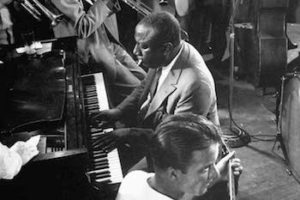
James P. Johnson
*This date marks the birth of James P. Johnson in 1894. He was a highly influential Black jazz pianist.
A founder of the stride piano style, he was essential in the transition from ragtime to jazz. From New Brunswick, N.J. James Price Johnson studied classical and ragtime piano techniques, and by his late teens, he was performing in saloons, dance halls, and at parties in the Black community on Manhattan's West Side, near Hell's Kitchen. While playing for dancers before 1920, he became noted for creating embellishments and improvisations on popular songs, including (relatively new at the time) the blues.
He made piano rolls followed by recordings of his songs. He also composed and orchestrated music for stage revues, including Keep Shufflin' 1928, collaborating with his leading student, Fats Waller. Johnson's symphonic works, including Yamecraw 1928, Harlem Symphony 1932, and the one-act opera De Organizer 1940, with words by Langston Hughes, have seldom been performed. Johnson’s stride piano, a development of ragtime, used two-beat left-hand rhythms to accompany right-hand melodies that featured uncommon variety. Characteristic pieces range from the up-tempo Carolina Shout and Balmorals to the delicate, reflective Blueberry Rhyme and Snowy Morning Blues.
Among his accompaniments was his work with singer Bessie Smith's Backwater Blues. The most popular songs that he wrote include The Charleston, Old Fashioned Love, and If I Could Be with You One Hour Tonight. James P. Johnson, who also wrote popular songs and composed classical works, died on Nov. 17, 1955, in New York City.
Nothing But the Blues The Music and the Musicians
Edited by Lawrence Cohn
Copyright 1993 Abbeville Publishing Group, New York
ISBN 1-55859-271-7